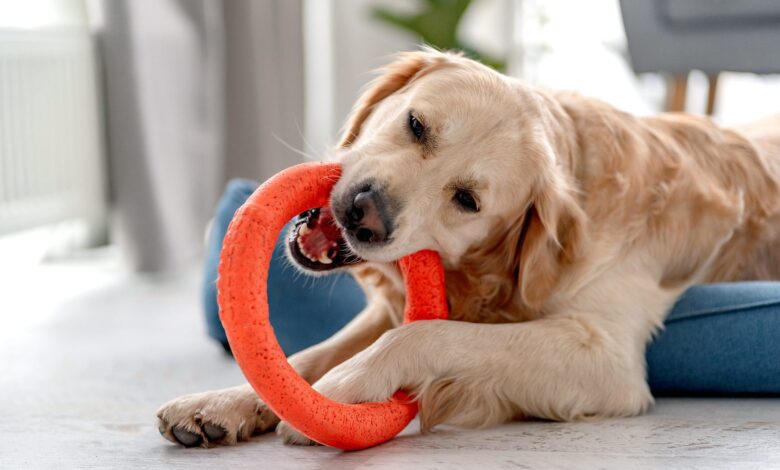My Dog Needs to Be Entertained Every Minute: How to Keep Your Dog Happy and Engaged

Dogs are lively, curious animals that thrive on mental and physical stimulation. It’s no secret that many dog owners find themselves in a situation where their dogs constantly crave attention and entertainment, leaving them overwhelmed by the constant demand. If you’re saying, “My dog needs to be entertained every minute,” you are certainly not alone. Dogs are wired for activity, and their need for engagement is deeply rooted in their nature as social and intelligent animals. This article will explore the reasons behind a dog’s seemingly endless need for entertainment and provide practical solutions to keep your dog happy, mentally stimulated, and well-behaved.
Understanding Your Dog’s Need for Entertainment
Many dog owners are familiar with the guilt they feel when they realize their dog is bored. Dogs don’t just lie around contentedly all day. They are wired to work, explore, and play. The constant need for stimulation often comes from a dog’s instincts. Before dogs became our furry companions, they were wild animals who had to hunt, forage, and solve problems for survival. This historical context helps explain why modern dogs still need an outlet for their mental and physical energy.
Different breeds also exhibit various levels of activity. High-energy breeds like Border Collies, Australian Shepherds, and Terriers often need more exercise and mental engagement than other breeds. However, even lower-energy dogs like Bulldogs and Shih Tzus benefit from regular stimulation. Your dog’s age, personality, and breed will all contribute to their unique entertainment needs.
Signs That Your Dog is Bored
A bored dog often exhibits specific behaviors that might signal their need for more stimulation. These behaviors can include:
- Destructive behavior: If your dog chews furniture, digs holes in the yard, or tears up household items, it’s often a sign of boredom. The dog may be using destructive activities as an outlet for its energy.
- Excessive barking or whining: Dogs that feel neglected or bored may become vocal, constantly barking or whining to get your attention.
- Restlessness: A dog that paces around the house or continually seeks out activity may indicate that it lacks mental or physical stimulation.
- Clinginess: Dogs that follow their owners from room to room, constantly seeking attention, often do so because they’re looking for engagement.
- Hyperactivity: If your dog seems to have boundless energy and can’t relax, even after a walk, it could be a sign they’re under-stimulated.
If these behaviors are familiar, your dog will likely express a need for more entertainment and interaction. Meeting those needs can go a long way toward improving your dog’s well-being and the harmony within your home.
Physical Activity: Keeping Your Dog Engaged Through Exercise
One of the most important ways to keep your dog entertained is by ensuring they get sufficient exercise. Dogs must burn off their physical energy regularly to stay healthy and content. The required amount and type of exercise will vary depending on your dog’s breed, age, and health.
Daily Walks
A walk around the neighborhood might seem simple, but it’s crucial for your dog’s mental and physical well-being. It allows your dog to explore new scents, interact with its environment, and release pent-up energy. A 30-minute walk is sufficient for some dogs, while others may need multiple walks or a more vigorous hike.
Running or Playing Fetch
For high-energy dogs, running in an open space or playing games like fetch can be an excellent way to burn off excess energy. Playing fetch also allows your dog to solve problems by chasing and retrieving objects.
Interactive Play
Playing tug-of-war or hide-and-seek is a fun way to engage your dog in mental and physical activity. These games stimulate your dog’s brain while providing physical exercise.
For dogs that need constant entertainment, incorporating more physical activity into their day is often the first step in reducing unwanted behaviors and improving their mood. However, physical exercise alone might not be enough for many dogs.
Mental Stimulation: How to Keep Your Dog’s Brain Active
While physical activity is essential, mental stimulation is just as crucial in keeping your dog entertained and happy. Dogs are intelligent animals that require cognitive challenges to prevent boredom.
Puzzle Toys and Treat-Dispensing Toys
Puzzle toys are one of the easiest ways to engage your dog mentally. These toys challenge your dog to figure out how to retrieve a hidden treat or move parts of the toy to achieve a goal. Treat-dispensing toys, such as Kong toys, can keep your dog occupied for hours as they work to get the treat out.
Training Sessions
Regular training sessions are an excellent way to keep your dog mentally stimulated. Teaching your dog new commands or tricks gives them a cognitive workout and strengthens the bond between you and your pet. Dogs love to learn, and teaching them to sit, stay, fetch, or even more advanced tricks will keep them engaged.
Scent Work
Dogs have an incredible sense of smell, and scent-based games can provide hours of mental stimulation. You can hide treats around your home or yard and let your dog use their nose to find them. This taps into your dog’s instincts and can be a fun challenge for them.
Interactive Dog Games
Technology has made it easier to entertain your dog with interactive games and puzzles. Electronic dog toys provide mental stimulation by making your dog problem-solve to get a reward. These can be especially helpful for dogs that need to be entertained while you’re busy or away from home.
Social Interaction: The Importance of Time with Other Dogs
Dogs are social animals, and many enjoy spending time with other dogs. Social interaction is an important part of keeping your dog entertained and well-balanced. If your dog enjoys the company of other dogs, arranging regular playdates or trips to the dog park can be a great way to provide mental and physical stimulation.
At the dog park, dogs can run freely, engage in social play, and learn important social skills. It can also help reduce their need for constant attention from you, as they will be preoccupied with the other dogs around them.
Introducing social activities slowly or setting up one-on-one play sessions with a familiar dog may be beneficial for dogs that are more introverted or nervous around other dogs. The key is finding a social outlet that suits your dog’s temperament.
Creating a Routine: Structure to Keep Your Dog Entertained
Dogs thrive on routine, and creating a structured play, exercise, training, and rest schedule can help reduce their anxiety and need for constant entertainment. When a dog knows what to expect during the day, it can help them feel more secure and less likely to demand attention at every moment.
For example, scheduling walks at the same time each day, incorporating training sessions in the evening, and providing interactive toys during alone time can help fulfill your dog’s needs without overwhelming you.
Dealing with Separation Anxiety: When Your Dog Needs Entertainment Even When You’re Not Home
Many dogs that seem to need constant entertainment may struggle with separation anxiety. When left alone, dogs with separation anxiety can become destructive, vocal, or even depressed.
To help alleviate this, you can:
- Provide distractions: Leave toys, puzzle games, and chew toys to keep your dog occupied while you’re away.
- Create a safe space: Give your dog a designated area where they feel comfortable and secure. Some dogs benefit from crate training, as the crate becomes their safe space.
- Hire a dog walker or sitter: If your dog struggles with long periods of alone time, hiring a dog walker or sitter can provide the interaction and exercise they need while you’re away.
Conclusion: Meeting Your Dog’s Need for Entertainment
If your dog needs to be entertained every minute, it’s important to recognize that this behavior stems from their instincts for activity and stimulation. Keeping your dog entertained is not just about keeping them busy—it’s about fulfilling their physical, mental, and social needs. Through regular exercise, cognitive challenges, social interaction, and a structured routine, you can help reduce your dog’s constant demands for attention while ensuring they are happy, healthy, and well-balanced. Remember, a well-stimulated dog is a happy dog, and with the right strategies in place, you can enjoy a harmonious life with your furry friend.
FAQs (Frequently Asked Questions)
What are the signs that my dog is bored and needs more entertainment?
Signs that your dog may be bored include destructive behaviors like chewing on furniture, excessive barking or whining, restlessness, and clinginess. A dog that constantly seeks attention or displays hyperactivity even after exercise may also be signaling boredom and the need for more mental or physical stimulation.
How much exercise does my dog need to stay entertained and healthy?
The amount of exercise depends on the breed, age, and energy levels of your dog. Most dogs benefit from at least 30 minutes to an hour of physical activity each day. High-energy breeds may require more vigorous exercise, such as running, playing fetch, or engaging in agility activities, to burn off their energy.
What are some easy ways to provide mental stimulation for my dog?
Mental stimulation can be provided through puzzle toys, treat-dispensing toys, regular training sessions, and scent games. Interactive toys and teaching new tricks are also excellent ways to engage your dog’s mind and keep them entertained for longer periods.
Can my dog get enough entertainment when I’m not at home?
Yes, with the right preparations, you can keep your dog entertained even when you’re away. Leave interactive toys, puzzle games, and long-lasting chew toys for them to engage with. Additionally, hiring a dog walker or arranging playdates can help break up your dog’s day and prevent boredom.
How can I reduce my dog’s need for constant entertainment and attention?
To reduce your dog’s demand for constant entertainment, ensure they are getting enough physical exercise and mental stimulation throughout the day. Create a structured routine, including regular walks, playtime, and training sessions. Introducing interactive toys or puzzles can help keep them occupied when you’re busy or unavailable to engage with them directly.




